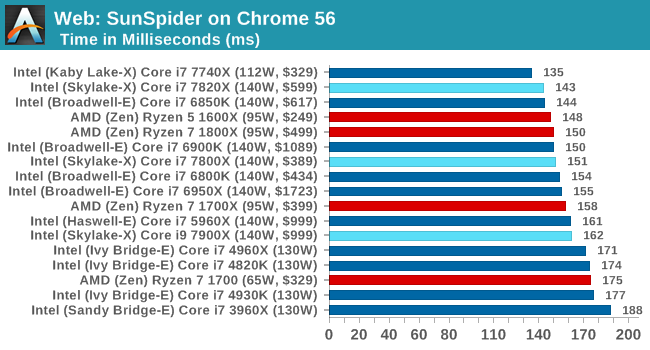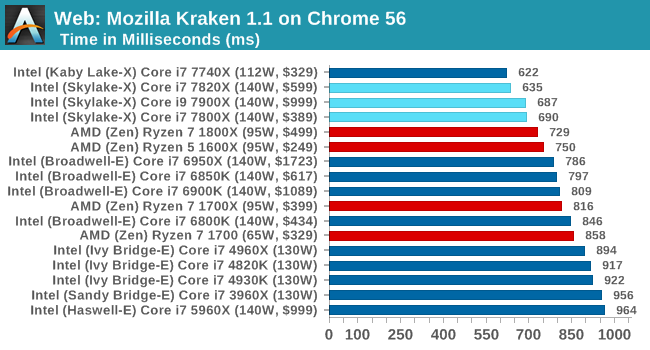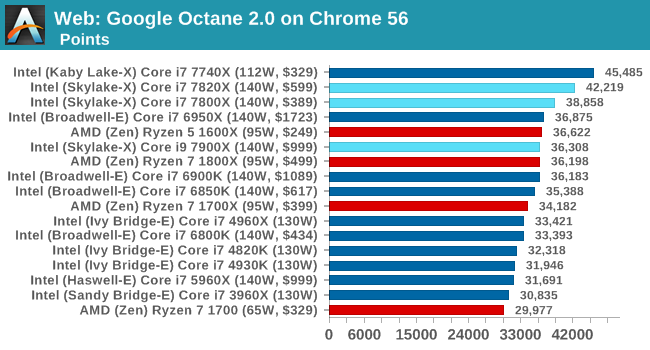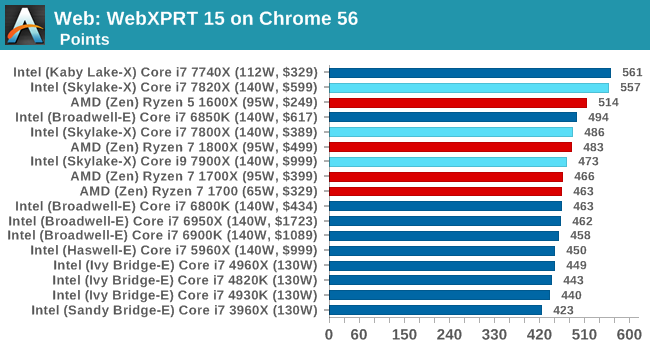The Intel Skylake-X Review: Core i9 7900X, i7 7820X and i7 7800X Tested
by Ian Cutress on June 19, 2017 9:01 AM ESTBenchmarking Performance: CPU Web Tests
One of the issues when running web-based tests is the nature of modern browsers to automatically install updates. This means any sustained period of benchmarking will invariably fall foul of the 'it's updated beyond the state of comparison' rule, especially when browsers will update if you give them half a second to think about it. Despite this, we were able to find a series of commands to create an un-updatable version of Chrome 56 for our 2017 test suite. While this means we might not be on the bleeding edge of the latest browser, it makes the scores between CPUs comparable.
SunSpider 1.0.2
The oldest web-based benchmark in this portion of our test is SunSpider. This is a very basic javascript algorithm tool, and ends up being more a measure of IPC and latency than anything else, with most high-performance CPUs scoring around about the same. The basic test is looped 10 times and the average taken. We run the basic test 4 times.

Sunspider goes after peak frequency most of the time, althoguh there is some variation as it moves into basically becoming a legacy test.
Mozilla Kraken 1.1
Kraken is another Javascript based benchmark, using the same test harness as SunSpider, but focusing on more stringent real-world use cases and libraries, such as audio processing and image filters. Again, the basic test is looped ten times, and we run the basic test four times.

Kraken is more of an intense attack on JS, and still regularly sorts by IPC and frequency.
Google Octane 2.0
Along with Mozilla, as Google is a major browser developer, having peak JS performance is typically a critical asset when comparing against the other OS developers. In the same way that SunSpider is a very early JS benchmark, and Kraken is a bit newer, Octane aims to be more relevant to real workloads, especially in power constrained devices such as smartphones and tablets.

Octane seems to be an optimization target, and with the new Skylake-X it shows.
WebXPRT 2015
While the previous three benchmarks do calculations in the background and represent a score, WebXPRT is designed to be a better interpretation of visual workloads that a professional user might have, such as browser based applications, graphing, image editing, sort/analysis, scientific analysis and financial tools.











264 Comments
View All Comments
Tuna-Fish - Tuesday, June 20, 2017 - link
Just a tiny nitpick about the cache hierarchy table:TLBs are grouped with cache levels, that is, L1TLBs are with the L1 caches and the L2 TLB is with the L2 cache, as if the level of TLB is associated with the level of cache. This is not how they work -- any request only has to have it's address translated once, when it's loaded from the L1 cache. If there is a miss when accessing the L1 TLB, the L2 TLB is accessed before the L1 cache is.
PeterCordes - Monday, July 3, 2017 - link
This common mistake bugs me too! The transistors for the TLB's 2nd level are probably not even near the L2 cache. (And the L2 cache is physically indexed / physically tagged, so it doesn't care about translations or virtual addresses at all). The multi-level TLB is a separate hierarchy from the normal caches.I also commented earlier to point out several other errors in [the uarch details](http://www.anandtech.com/comments/11550/the-intel-... e.g. mixing up the register-file sizes with the scheduler size.
yeeeeman - Tuesday, June 20, 2017 - link
What this review shows just how good of a deal AMD Ryzen CPUs are. I mean, R7 1700 is like 300$ and it keeps up in many of the tests with the big boys from Intel.Carmen00 - Tuesday, June 20, 2017 - link
Small typo on the first page, Ian: "For $60 less than the price of the Core i7-7800X...". But the comparison shows $389 vs $299, which is a $90 difference. Otherwise a fantastic, in-depth review, thank you very much!Ian Cutress - Tuesday, June 20, 2017 - link
Official MSRPs haven't changed. What distributors do with their stock is a different story.Carmen00 - Wednesday, June 21, 2017 - link
I'm talking about the MSRPs. There's a table ("Comparison: Core i7-7800X vs. Ryzen 7 1700") on Page 1 with the MSRPs as $299 and $389, a $90 difference. The text just above this table says that there's a $60 difference, but 389-299=90, not 60. So either the text is incorrect, or the MSRPs in the table are incorrect.Tephereth - Tuesday, June 20, 2017 - link
Missing temps and in-game benchmarks... u're the only one in the whole web that has an 7800x to test, so please post those :(Gothmoth - Tuesday, June 20, 2017 - link
after reading a dozend reviews i say:great now we have the choice between two buggy platforms.... well done.
i am not going to be a bios betatester for AMD or Intel.
these two release are the worst in many years i would say.
i hope AMD has threadripper ironed out.
AntDX316 - Tuesday, June 20, 2017 - link
The new processors are in totally another level/league/class. It dominates in everything and more except a couple benches.AnandTechReader2017 - Tuesday, June 20, 2017 - link
Of course they are, Ryzen is mainstream, Thread Ripper is the competitor.Thread Ripper will be quite interesting, the scaling of the "infinity fabric" will come to the fore and show if AMD's new architecture is a worthy competitor.